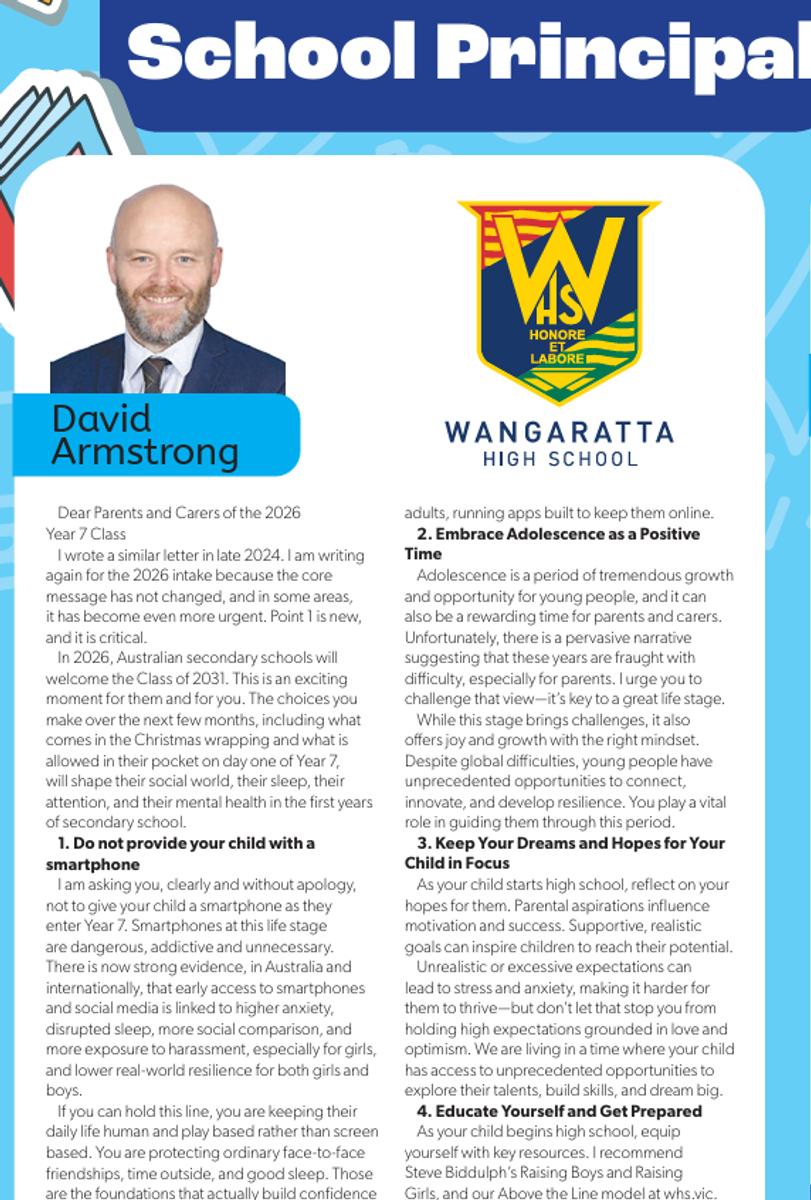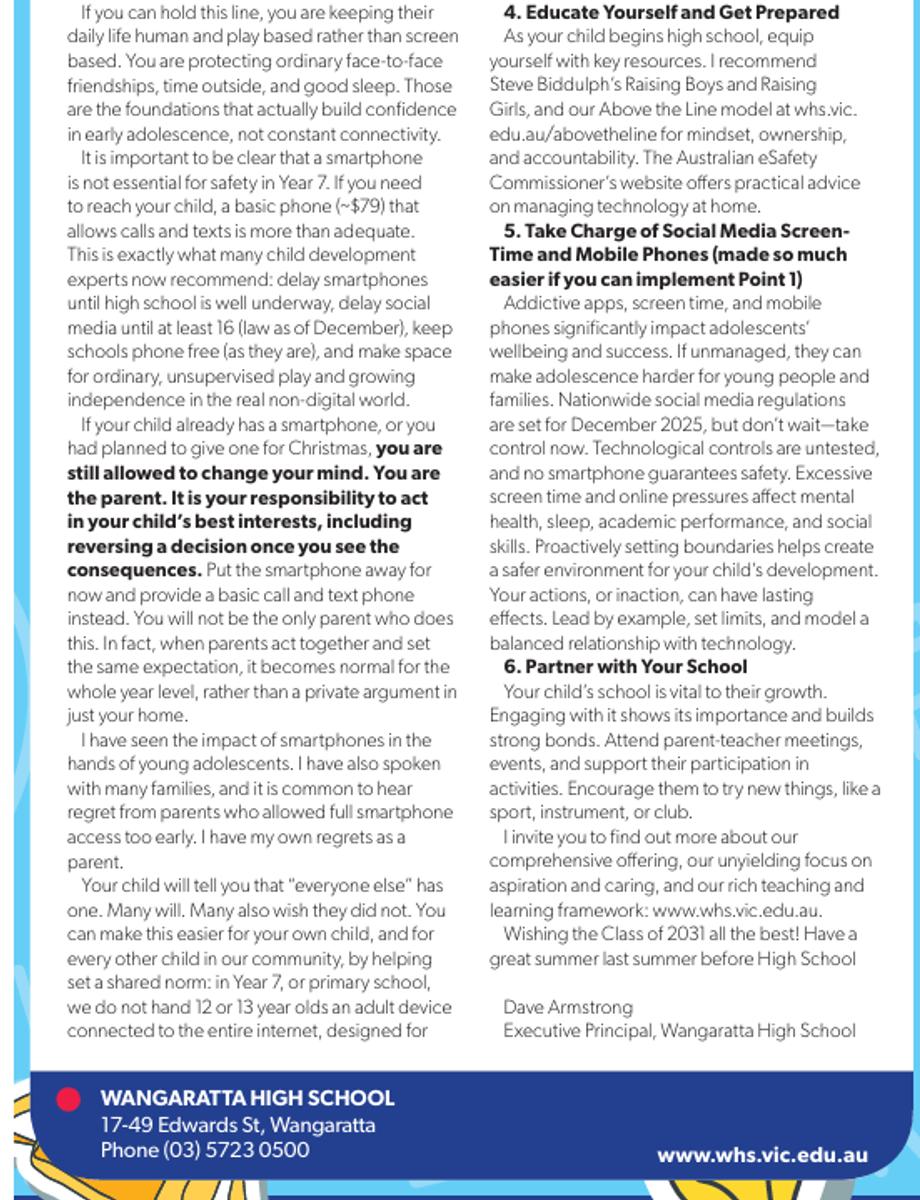From our Principal:Forthcoming social media bans for under 16 & advice for parents of younger adolescents

You have likely seen recent media coverage of the Australian Government’s new social media age restrictions for under-16s, which come into effect on 10 December this year. From that date, many major social media platforms will be required to take reasonable steps to prevent Australians under 16 from creating or keeping an account. In various forums, including publicly, I have shared my views as an educational leader about the impact that device-based childhoods are having on young people.
The age restrictions are likely to apply to Facebook, Instagram, Kick, Reddit, Snapchat, Threads, TikTok, X and YouTube, as well as other platforms. See the latest list.
Take action now at home
Many parents and carers are understandably worried about how their child will react to losing access to social media accounts. You are not alone in this. It is common for tensions to rise when people are coping with change, particularly if they do not want it to happen. Some young people may feel upset, anxious, frustrated or angry. Others may try to binge on social media before the restrictions start, or to find ways around the rules.
This can be especially challenging where there are older siblings who are still allowed to use social media, or when different households and carers have different expectations. These differences can create resentment and conflict, both at home and within friendship groups. It is important to keep the focus on your child’s wellbeing and to remember that conflict about devices can be stressful for them as well as for adults.
Parents and carers can support their children by talking calmly and openly about the age restrictions. This includes asking how they currently use social media, helping them understand how the law might affect them, and explaining that the changes are designed to protect them, not to punish them. It can also help to focus on what they can still do, both online and offline, and to reassure them that they can always come to you or another trusted adult if they are worried or if something goes wrong. Often, several shorter conversations over time are more effective than one big talk.
Advice, information and help
The best guide for families is the eSafety Commissioner’s website, which provides clear explanations of the age restrictions, practical conversation starters, and a “Get ready” guide to help under 16s prepare for the change and find other ways to connect, create and be entertained: https://www.esafety.gov.au/parents/social-media-age-restrictions. You can also share this information with other parents and carers, agree on consistent expectations for situations such as sleepovers and shared devices, and work with your child’s school community so that no family feels they have to manage this change on their own.
My recent advice to parents commencing Year 7 - relevant to all
In this context, I have again written to families of students who will commence Year 7 at Wangaratta High School in 2026, the Class of 2031. A public facing version of that letter was recently published in The Chronicle, and I am sharing it here because the message is just as relevant for current families of students in Years 7, 8 and 9, and for those with children about to enter secondary school. It sets out my perspective on smartphones for young adolescents and practical steps parents can take to protect their child’s wellbeing in the early years of high school, particularly in light of the forthcoming social media age restrictions.
Dear Parents and Carers of the 2026 Year 7 Class
I wrote a similar letter in late 2024. I am writing again for the 2026 intake because the core message has not changed, and in some areas, it has become even more urgent. Point 1 is new, and it is critical.
In 2026, Australian secondary schools will welcome the Class of 2031. This is an exciting moment for them and for you. The choices you make over the next few months, including what comes in the Christmas wrapping and what is allowed in their pocket on day one of Year 7, will shape their social world, their sleep, their attention, and their mental health in the first years of secondary school.
1. Do not provide your child with a smartphone
I am asking you, clearly and without apology, not to give your child a smartphone as they enter Year 7. Smartphones at this life stage are dangerous, addictive and unnecessary. There is now strong evidence, in Australia and internationally, that early access to smartphones and social media is linked to higher anxiety, disrupted sleep, more social comparison, and more exposure to harassment, especially for girls, and lower real-world resilience for both girls and boys.
If you can hold this line, you are keeping their daily life human and play based rather than screen based. You are protecting ordinary face-to-face friendships, time outside, and good sleep. Those are the foundations that actually build confidence in early adolescence, not constant connectivity.
It is important to be clear that a smartphone is not essential for safety in Year 7. If you need to reach your child, a basic phone (~$79) that allows calls and texts is more than adequate. This is exactly what many child development experts now recommend: delay smartphones until high school is well underway, delay social media until at least 16 (law as of December), keep schools phone free (as they are), and make space for ordinary, unsupervised play and growing independence in the real non-digital world.
If your child already has a smartphone, or you had planned to give one for Christmas, you are still allowed to change your mind. You are the parent. It is your responsibility to act in your child’s best interests, including reversing a decision once you see the consequences. Put the smartphone away for now and provide a basic call and text phone instead. You will not be the only parent who does this. In fact, when parents act together and set the same expectation, it becomes normal for the whole year level, rather than a private argument in just your home.
I have seen the impact of smartphones in the hands of young adolescents. I have also spoken with many families, and it is common to hear regret from parents who allowed full smartphone access too early. I have my own regrets as a parent.
Your child will tell you that "everyone else" has one. Many will. Many also wish they did not. You can make this easier for your own child, and for every other child in our community, by helping set a shared norm: in Year 7, or primary school, we do not hand 12 or 13 year olds an adult device connected to the entire internet, designed for adults, running apps built to keep them online.
2. Embrace Adolescence as a Positive Time
Adolescence is a period of tremendous growth and opportunity for young people, and it can also be a rewarding time for parents and carers. Unfortunately, there is a pervasive narrative suggesting that these years are fraught with difficulty, especially for parents. I urge you to challenge that view—it’s key to a great life stage.
While this stage brings challenges, it also offers joy and growth with the right mindset. Despite global difficulties, young people have unprecedented opportunities to connect, innovate, and develop resilience. You play a vital role in guiding them through this period.
3. Keep Your Dreams and Hopes for Your Child in Focus
As your child starts high school, reflect on your hopes for them. Parental aspirations influence motivation and success. Supportive, realistic goals can inspire children to reach their potential.
Unrealistic or excessive expectations can lead to stress and anxiety, making it harder for them to thrive—but don’t let that stop you from holding high expectations grounded in love and optimism. We are living in a time where your child has access to unprecedented opportunities to explore their talents, build skills, and dream big.
4. Educate Yourself and Get Prepared
As your child begins high school, equip yourself with key resources. I recommend Steve Biddulph’s Raising Boys and Raising Girls, and our Above the Line model at whs.vic.edu.au/abovetheline for mindset, ownership, and accountability. The Australian eSafety Commissioner’s website offers practical advice on managing technology at home.
5. Take Charge of Social Media Screen-Time and Mobile Phones (made so much easier if you can implement Point 1)
Addictive apps, screen time, and mobile phones significantly impact adolescents' wellbeing and success. If unmanaged, they can make adolescence harder for young people and families. Nationwide social media regulations are set for December 2025, but don’t wait—take control now. Technological controls are untested, and no smartphone guarantees safety. Excessive screen time and online pressures affect mental health, sleep, academic performance, and social skills. Proactively setting boundaries helps create a safer environment for your child's development. Your actions, or inaction, can have lasting effects. Lead by example, set limits, and model a balanced relationship with technology.
6. Partner with Your School
Your child’s school is vital to their growth. Engaging with it shows its importance and builds strong bonds. Attend parent-teacher meetings, events, and support their participation in activities. Encourage them to try new things, like a sport, instrument, or club.
I invite you to find out more about our comprehensive offering, our unyielding focus on aspiration and caring, and our rich teaching and learning framework: www.whs.vic.edu.au.
Wishing the Class of 2031 all the best! Have a great summer last summer before High School
Dave Armstrong
Executive Principal, November 2025


